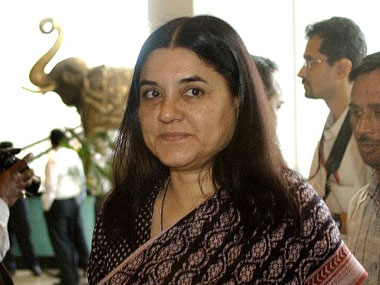The ‘MeToo’ movement, primarily singeing newsrooms and the entertainment industry, reached the power corridors in Delhi when at least
half a dozen women came on record to name former journalist and presently junior minister in the Ministry of External Affairs MJ Akbar. However, the ruling Bharatiya Janata Party (BJP) has chosen to remain silent. The party’s spokespersons
have evaded responding on email or text, when asked about allegations against the former journalist. While there are a few
BJP politicians who are finding fault with the entire MeToo campaign. Union Minister for Women and Child Development, Maneka Gandhi, is the only BJP leader who, so far, has openly reacted to the stream of survivors’ accounts, naming prominent personalities, pouring out on social media. Though the minister did not explicitly react to allegations against Akbar, she did assert that the survivors’ voice should not be questioned and a probe should be carried out in such cases. Maneka spoke to India Today after the accusations against Akbar, and others, made headlines: “There should be an investigation. Those who are in positions of power always use it, whether it is film, media or industry. Whenever women make such allegations, we should take them very seriously,” she said. [caption id=“attachment_5068181” align=“alignleft” width=“380”] File image of Maneka Gandhi. AFP[/caption] “Women are scared of speaking out thinking people will make fun of them or question their character. Now that women are speaking up we should take action on each and every allegation,” she added while responding to a questions specifically about a “
big politician" named in multiple survivors’ accounts. Meanwhile, many media reports took special note of the fact that Sushma Swaraj, who heads the ministry in which Akbar works, refused to comment on the sexual harassment allegations against her junior minister. As reporters persisted with their questions, some even urging her to respond as a
“woman minister”, she walked past them without giving an answer. BJP’s usually articulate and vociferous spokesperson Sambit Patra also refused to make a comment on the issue as he avoided a volley of questions thrown at him by reporters. Continuing to address a press conference on another issue, he said his mandate was to speak on the specific issue of the Congress role in allegedly fomenting violence against migrants in Gujarat. In contrast, Maneka, even
came out in support of actor Tanushree Dutta, whose allegations against well-known social worker and veteran actor Nana Patekar sparked off the movement in India with more women recounting their experiences of sexual harassment in the entertainment and media industry. In a TV interview after Tanushree’s allegations came to light, Maneka told Republic TV that there should absolutely be no time frame as to when a victim of sexual assault can register her complaint, while adding that “harassment of any kind will not be tolerated.” However, the Women and Child Development Minister
did warn against the misuse of such a powerful movement. She said she is happy that MeToo has started in India, while she expressed hope hat “it won’t go out of control, in the sense that we target people who’ve offended us in some way”. Speaking about the questions raised on the delayed action on part of some of the survivors, Maneka said, “One always remembers the person who molested you and we have written to the law ministry that one should be allowed to complain without any time limit.” However, BJP MP Udit Raj
questioned why women were coming out with their stories ten years after the alleged incidents and dubbed it as the “beginning of wrong practice”. “It must also be considered that it can ruin the public image of accused person,” the Bharatiya Janata Party (MP) from northwest Delhi said in a tweet. Later answering a query about Akbar, he repeated his remarks about the damage to a person’s reputation if allegations turn out to be false. With inputs from agencies
Maneka, in contrast is also one of the very few voices to have reacted to the MeToo movement as she even came out in support of actor Tanushree Dutta, whose allegations against well-known social worker and veteran actor Nana Patekar sparked off the movement in India
Advertisement
End of Article


)

)
)
)
)
)
)
)
)



